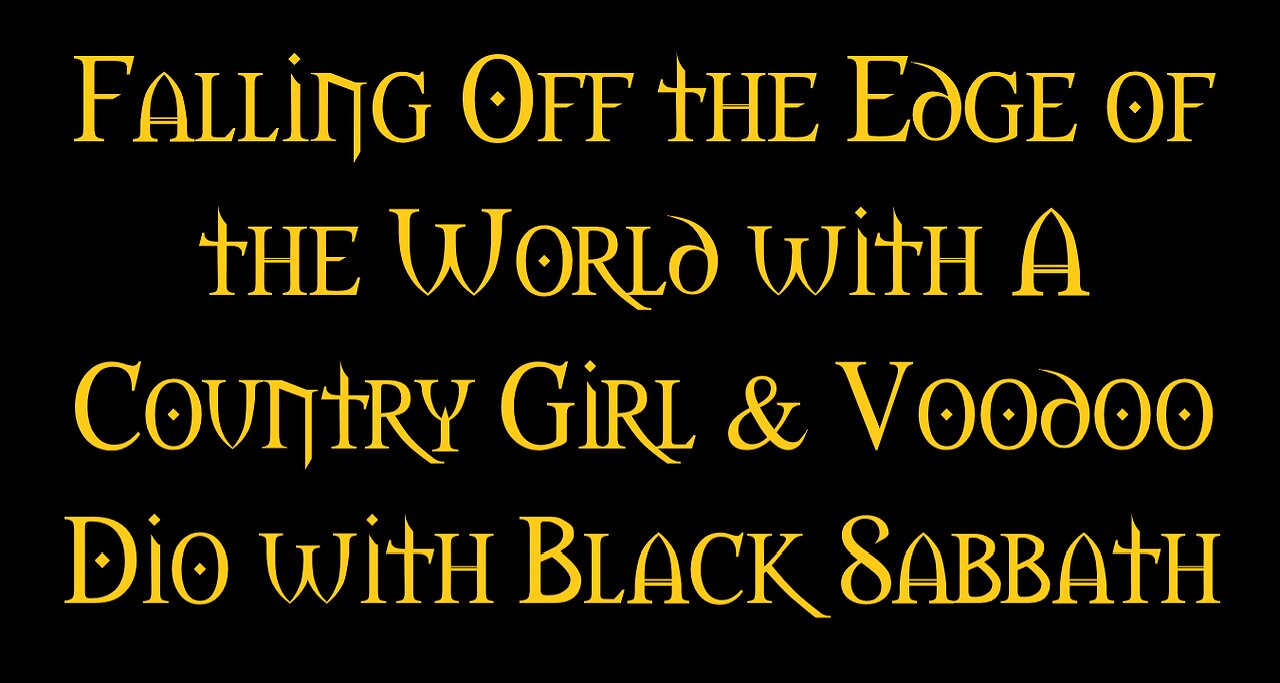Premium Only Content

Falling Off the Edge of the World with a Country Girl & Voodoo by Dio and Black Sabbath
Falling Off the Edge of the World with a Country Girl & Voodoo by Dio and Black Sabbath
The Warhammer world drew inspiration from Tolkien's Middle-earth, but also from Robert E. Howard (Conan the Barbarian) and Michael Moorcock, as well as real-world history, particularly European history. What is recognizable as the Warhammer World began with the expansion material to the first edition of the game Warhammer, but was formulated as a distinct setting with a world map in the second edition.
The Warhammer World borrowed considerably from historical events and other fantasy fiction settings. The Old World is recognisably Europe approximating to various historical periods including the Renaissance - the Empire being set over what was the Holy Roman Empire - medieval France, Roman Italy and Celtic Britain. Many events are lifted and modified directly from history, including the Black Plague and the Moorish invasion of Spain, and others from original fantasy sources. Like Middle-earth, Warhammer's Dwarfs are declining in population, the Elves have mostly departed for homelands in the West, and a Great Necromancer is reborn after the defeats in his Southern stronghold.
There are numerous nations and races in the Warhammer World. Mankind, the most prominent, often proves to be the most susceptible to the corrupting influence of Chaos. Most of the featured human nations are based in the Old World (analogous to real world Europe): The Empire (Holy Roman Empire), Bretonnia (France and Arthurian Britain), and Kislev (Russia). Further east of them is another powerful human civilisation known as Grand Cathay (corresponding to China).
Many factions, such as the Elves, the Lizardmen, the Ogres and the Halflings, have been created by the Old Ones: star-travelling gods responsible for the creation of most of the setting's sentient races. These Old Ones were brought low by the daemonic forces inadvertently unleashed by the collapse of their Warp Gates (one on the North Pole and one on the South Pole), leaving their creations to fend for themselves. This backstory also provides an easy explanation for the presence of a variety of familiar fantasy races. Ogres and Halflings, for example, are closely related. Both are resistant to the mutating effects of Chaos energies (fuelled by hearty appetites and efficient metabolisms), but have opposite physical templates.
Mob Rules is the tenth studio album by English heavy metal band Black Sabbath, released in November 1981. It followed 1980's Heaven and Hell, and was the second album to feature lead singer Ronnie James Dio and the first with drummer Vinny Appice. Neither musician would appear on a Black Sabbath studio album again until the 1992 album Dehumanizer.
Produced and engineered by Martin Birch, the album received a remastered Deluxe Edition release in 2010 and an expanded edition in 2021.
The first new recording Black Sabbath made after the Heaven and Hell album was a version of the title track "The Mob Rules" for the soundtrack of the film Heavy Metal. The track "E5150" is also heard in the film but not included on the soundtrack. According to guitarist Tony Iommi's autobiography Iron Man: My Journey Through Heaven & Hell with Black Sabbath, the band began writing and rehearsing songs for Mob Rules at a rented house in Toluca Lake in Los Angeles. Initially the band hoped to record in their own studio to save money and actually purchased a sound desk; but, according to Iommi, "We just couldn't get a guitar sound. We tried it in the studio. We tried it in the hallway. We tried it everywhere but it just wasn't working. We'd bought a studio and it wasn't working!" The band eventually recorded the album at the Record Plant in Los Angeles.
Mob Rules was the first Sabbath album to feature Vinny Appice on drums, who had replaced original member Bill Ward in the middle of the Heaven and Hell tour. Asked by Joe Matera in 2007 if working with a new drummer was jarring after so many years, bassist and lyricist Geezer Butler replied, "No, because Vinny was a big fan of the band and loved Bill's playing. Bill was one of his favourite drummers and so he knew all his parts and my bass parts and he adjusted accordingly to everybody in the band. He was brilliant. He came in and totally filled in Bill's shoes."
Mob Rules would be singer Ronnie James Dio's second and final studio recording with Black Sabbath until the Mob Rules-era line-up reunited for 1992's Dehumanizer. The seeds of discontent appear to have sprouted when Dio was offered a solo deal by Warner Brothers, with Iommi stating in his memoir, "After the (Heaven and Hell) record became such a great success, Warner Brothers extended the contract at the same time, offering Ronnie a solo deal. That felt a bit odd to us, because we were a band and we didn't want to separate anybody." Dio confided in an interview on the Neon Nights: 30 Years of Heaven and Hell DVD that the recording of Mob Rules was far more difficult for him than Heaven and Hell because "we approached the writing very much differently than the first one. Geezer had gone so we wrote in a very controlled environment in a living room with little amplifiers. And with Mob Rules we hired a studio, turned up as loud as possible and smashed through it all. So it made for a different kind of an attitude".
Vinny Appice stated in a 2021 interview with Pariah Burke that the writing for the album was largely a collaborative process done through jam sessions. He stated, "We put [songs] together by jamming and playing together and putting ideas in the pot. It's a natural way of doing it and it works really well for us. That's how we did all the big albums like Mob Rules and Holy Diver. Nobody came in with a song.”
Iommi reflected to Guitar World in 1992, "Mob Rules was a confusing album for us. We started writing songs differently for some reason, and ended up not using a lot of really great material. That line-up was really great, and the whole thing fell apart for very silly reasons — we were all acting like children." The major problem, noted by Mick Wall in his book Black Sabbath: Symptom of the Universe, was that the balance of power within the band had shifted.
-
 13:00
13:00
Psychological operations
3 days agoJason Voorhees The Knife Deathshot The Chuck Norris Experiment
37 -
 1:01:17
1:01:17
The StoneZONE with Roger Stone
14 hours agoChristmas Edition: Why the Panama Canal is Part of the America First Agenda | The StoneZONE
110K42 -
 18:12:15
18:12:15
LFA TV
1 day agoLFA TV CHRISTMAS EVE REPLAY
128K14 -
 13:32
13:32
Scammer Payback
16 hours agoChanging the Scammer's Desktop Background to his Location
2.87K3 -
 4:21
4:21
BIG NEM
18 hours agoNikola Tesla's Secret to Cultivating Creativity & Genius
1.49K1 -
 15:03
15:03
The Anthony Rogers Show
1 day agoAnthony Rogers - Live at Cusumano's Pizza (Upstairs)
1.2K1 -
 4:33:48
4:33:48
tacetmort3m
1 day ago🔴 LIVE - THE ZONE KEEPS PULLING ME BACK - STALKER 2 - PART 15
68K12 -
 22:45
22:45
Brewzle
22 hours agoI Went Drinking In A Real Bourbon Castle
49K4 -
 48:36
48:36
PMG
1 day ago $4.30 earned"Parkland Parent Speaks Out On Kamala Harris Using Victims"
40.1K12 -
 4:06
4:06
The Lou Holtz Show
20 hours agoCoach Lou Holtz’s Heartfelt Christmas Message 🎄 | Family, Faith & Notre Dame Spirit 💚 #christmas
29.6K